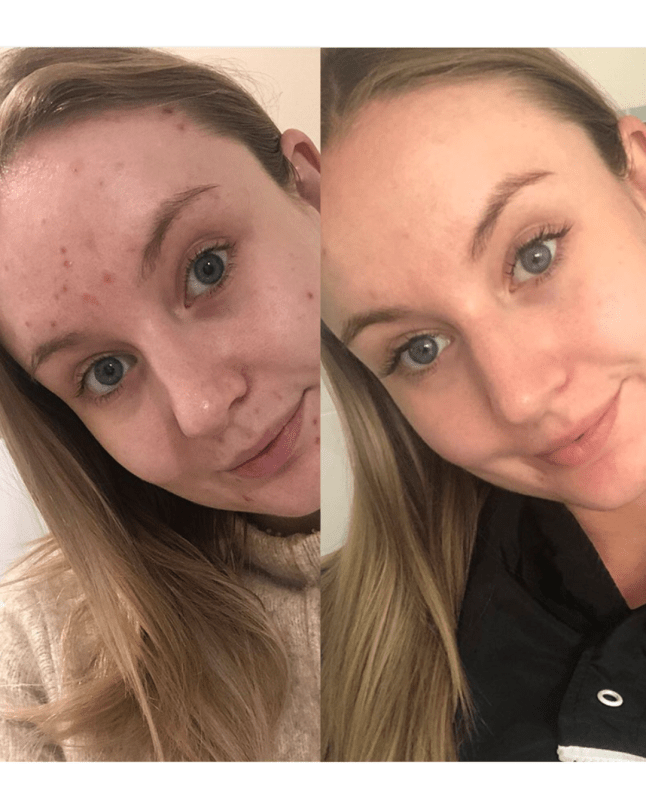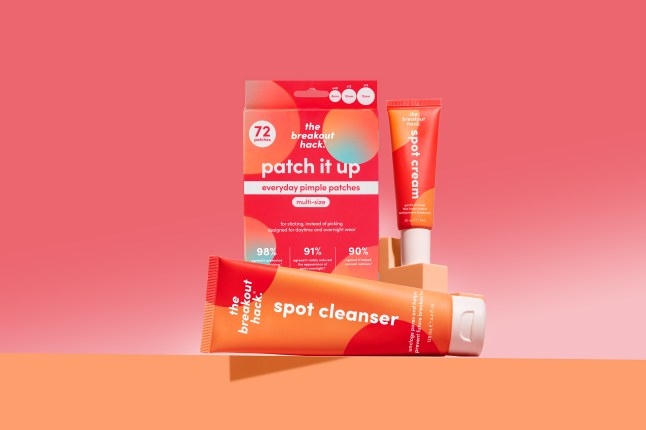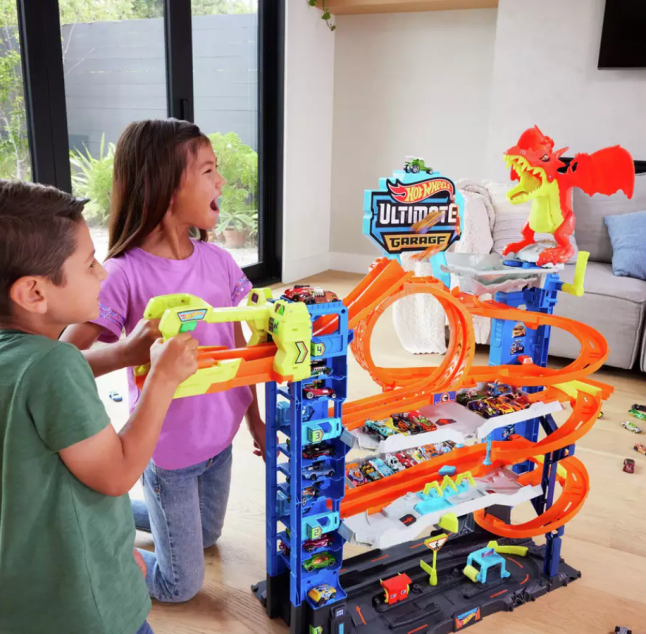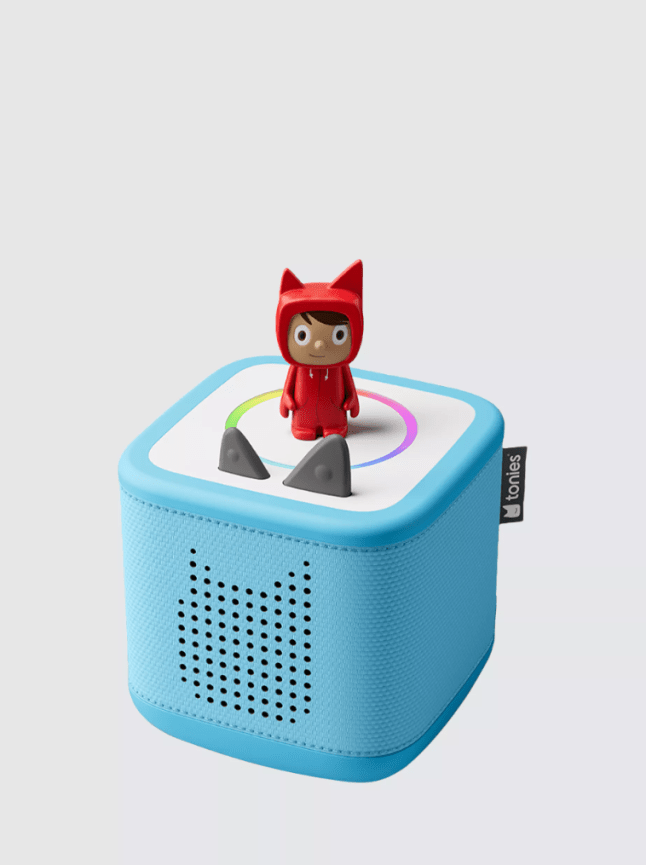10 Dec, 2025 | Admin | No Comments
Lisa Snowdon’s M&S party outfit could pass for Chanel – and it’s still available to shop

Lisa Snowdon looked like she’d stepped straight off the runway in Marks & Spencer’s metallic navy blue tweed co-ord for an appearance on This Morning on Tuesday.
10 Dec, 2025 | Admin | No Comments
Embrace your inner Santa Claus, spread that festive joy from these Christmas buys from £3.50

Metro journalists select and curate the products that feature on our site. If you make a purchase via links on this page we will earn commission – learn more
As we move into the festive season and start purchasing gifts for loved ones, it’s also a time to transform our homes with simple additions to embrace the season.
Of course, the main attraction is all about the Christmas tree, but we can’t forget to add other touches around the home to transform the space into a true winter wonderland.
If you’re someone who is struggling to get into the yuletide celebrations, then these simple interior upgrades will have you rocking around the Christmas tree in seconds.
Decorations don’t have to break the bank, thankfully for us, Dunelm has got us sorted with a wide variety of affordable options that will effortlessly amp up your space.
Whether you’re after a winter-inspired candle, a new duvet set, some festive foliage, or the perfect tablescape accessories, we’ve been good elves and sifted through and found the best of the best.
So, sit back and relax with a cup of hot cocoa whilst you scroll and get inspired.
Shop Dunelm’s New Christmas Home Accessories:

The Christmas Gift Co Ceramic 19cm LED Light Up Christmas Tree
Add to the cosy atmosphere at home with this sculptural ceramic LED Christmas tree that can be placed anywhere in the home, from the living room, sideboard, or even the bathroom. Its simple design will add more of a modern touch to the space and will match any pre-existing decor.

Artificial Red Berry & Spruce Arrangement in Round Glass Vase
People can usually underestimate the effect of adding some festive foliage to the home. However, it can immediately elevate the area by incorporating texture into the decor.
By bringing the outdoors in, it also adds a more calming, warm atmosphere, and better yet, it comes in a round glass vase, so it’s fuss-free; all you have to decide on is where to position it.

furn. Cotswolds Christmas Duvet Cover and Pillowcase Set
A Christmas-inspired duvet set is an absolute must at this time of year. This set features not just one, but two timeless designs, so you can pick and choose which one you’d like. One is a cute drawing pattern featuring homes in the snow, whilst the second is a deep red gingham print, which is a perfect nod to the time of year.

Cedar and Sage Merry Holly Tis The Season Coir Doormat
One home accessory we often forget is a doormat. Spread cheer to guests with a joyful 'Tis the Season' option. This design comes with a playful holly print and cheerful messaging. It is made from durable coir fabric and anti-slip backing, so it will last throughout the season.

Mulled Wine Multi Wick Candle
Candles are a brilliant and easy addition that immediately builds a cosy atmosphere. Why not fill the space with scents of the most iconic drink at this time of year, mulled wine? Bursting with tasteful blends of sweet orange, red wine, warm spices, rich amber and cinnamon, it makes it suitable for a couple's night, friendmas, or to burn on the big day.

Set of 2 Bow Napkin Rings
If you’re someone who loves or can appreciate a good tablescape, and let's face it, who doesn't? Then these bow napkin rings are a must. Add a festive flair to your dining area with this subtle yet effective fabric accessory. They come in packs of two, so you can purchase the perfect amount that you might need. You can also use these beyond the festive season for an occasion that might come along during the year.

Set of 4 Christmas Slogan Beaded Coasters
This set of four Christmas slogan coasters will not only protect your tabletops during gatherings, but they’ll subtly add a fun and cheerful twist that guests will appreciate. The contrasting colourways on each coaster breaks away from the traditional tones and injects more of an energetic, kitsch edge.

Gold Stag Aluminium Salt and Pepper Shakers
Introduce two new members to the dining table with these gold stag salt and pepper shakers, adding an elegant and rich touch whether they’re being used or positioned on the kitchen side. Made from aluminium and designed with a gold coating will prevent the products from rusting, so you can use them throughout the season and beyond.

Artificial Frosted Light Up Wreath with Lambs Ear
Wreaths aren’t just for doors, they can be used throughout the home on walls, mantles and even as a decorative touch to surround candles. The warm LED lights are dispersed throughout the greenery to add a warm glow, whilst the snow and foliage bring a wintery forest feel to the home.

The Christmas Gift Co 15 Piece Christmas Train Track with Lights and Sound
If you want to go full-on Christmas fantasy, then this train set is the perfect addition to the base of your tree. The bright seasonal colours and vintage detailing automatically builds a nostalgic feel, whilst the themed carriages that include Santa’s sleigh with a tree and a gingerbread-style wagon add a playful touch. If you’ve got the space, why not make a full feature of the set and combine various decorations to build a festive scene?
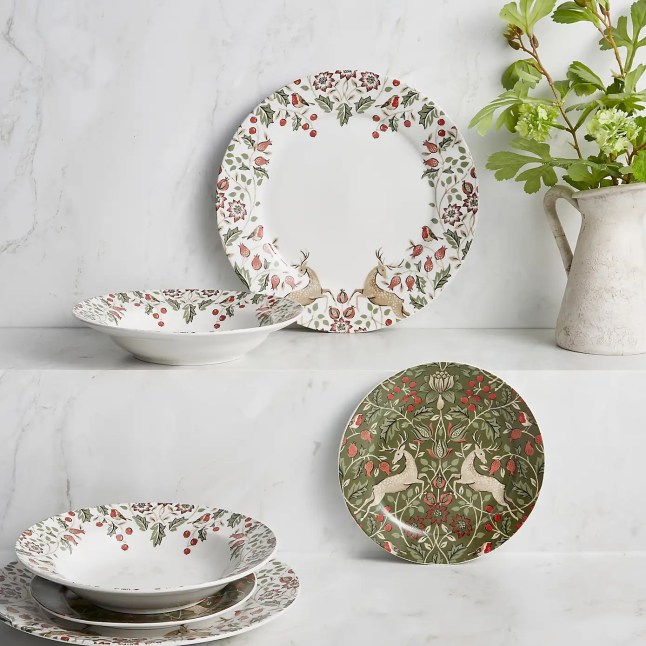
Winter Forest 12 Piece Dinner Set
Invest in a seasonally designed dinner set to impress when hosting. Elegantly designed with delicate florals and holly, bright berries and sweet deer illustrations with forest greens, crisp whites, all creating a sophisticated appearance. In the set you’ll receive four dinner plates, 4 side plates and 4 pasta bowls, which are a slightly larger size to allow for sharing dishes.

12ft Artificial Vermont Pine Garland
Let's go full Home Alone and cover every inch of the home with festive garlands. Providing the appearance of realistic pine and cones, this lifelike foliage will amplify the Christmas cheer. Its generous 12ft length makes it ideal for staircases, mantelpieces and doorways. Why not add another touch by wrapping fairy lights around to create a warm glow? These can also be used year after year, getting maximum use out of them.

Bow Boucle Square Cushion
A Christmas cushion is a must. It automatically adds a festive and joyful touch, whether they’re placed on the sofa or bed. It doesn’t have to be full-on red, green, slogan, Santa, snowman themed design, opt for a more laidback, chic approach like this bow boucle option. However, if you did want to go full kitsch, then this £12 Red & Pink Candy Cane Cushion is perfect.

Christmas Tree Faux Fur Green Throw
Picture this, you’ve just made a hot chocolate, you’re in your Christmas-theme pyjamas and are about to watch your favourite festive movie. The only thing missing in this is a blanket to snuggle under and embrace the atmosphere you’ve created. We’re big fans of this deep green soft faux fur throw that features a subtle Christmas tree design.
Follow Metro across our social channels, on Facebook, Twitter and Instagram
Share your views in the comments below
10 Dec, 2025 | Admin | No Comments
Best royal style of December 2025 – including Princess Kate’s new diamond tiara

See the best royal style photos of the month as part of HELLO!’s Royal Style Watch for December 2025. See pictures of the Princess of Wales, Duchess Sophie, Princess Charlene & more.
A woman has shared a clip of her boyfriend’s food diary where he writes down the things he eats every single day, and he made an admission aout eating carrots daily
10 Dec, 2025 | Admin | No Comments
I jump up and down 50 times when I wake up — don’t knock it till you try it


I’ve never really been much of a morning person. I love a lie-in and can easily rot away in bed until midday (or later) if left to my own devices.
Alas, this only really happens on weekends, as the rest of the time my alarm goes off at 6AM.
You can imagine then, that I struggle to get myself up and ready promptly each day. it usually takes a solid 30 minutes before I start feeling like a functioning human being.
So, when I heard there was a ‘lazy girl hack’ that might help me feel more awake in just 60 seconds, I jumped on it… literally.
TikToker Kathryn Smith recently went viral on TikTok for a video in which she revealed that jumping up and down for 60 seconds first thing in the morning had ‘changed her life’.
‘I am a lazy person by nature, I always have been, and I’m never going to do something I don’t want to do, how I’ve gotten to the point [in life] where I am now, has been baby steps,’ she explained.
‘The first thing I do is morning jumping. When I get out of bed, as soon as my feet touch the ground, I jump 50 times.’
Kathryn, a surgical athletic trainer, went on to claim that jumping helps to ‘increase the functions of our body’ as it increases blood flow, gets our heart rate up, and sends more oxygen to the brain.
More than 460,000 people liked her video, with thousands commenting to say they were going to give it a go, and as a sucker for a good TikTok trend (and a self-proclaimed lazy girl), I decided to join them.
So, for the last two weeks, I’ve jumped up and down 50 times every morning, and honestly, I do think it makes a real difference.
When I’m done, I feel more awake and alert than before – something usually only a big mug of tea can achieve at that time of day.

The jumps aren’t super high, I’m not leaping into the air High School Musical-style or anything, it’s more akin to a little bunny hop, really. My feet only just leave the ground.
Sure, it felt a bit silly to do this at first, but don’t knock it till you’ve tried it – the more you jump, the more you’ll start to enjoy it. I’ve found that it’s added a little whimsy to my morning, which is a bonus.
And even if you don’t enjoy it as much as me, it’s over in 60 seconds or less, which is what I love most about it. It takes hardly any time at all to do.
But is it really doing me any good, or is it some strange placebo effect? I asked a doctor for her thoughts on the jumping trend. Here’s what she had to say…
What does a doctor think?
Dr. Suzanne Wylie, a GP and medical advisor for IQdoctor, told Metro that jumping up and down can feel ‘energising’.
She explained: ‘The trend is generally safe for most healthy adults and can have some genuine physiological effects that might explain why people feel more awake afterwards.
‘When you jump repeatedly, even for just around a minute, several things happen in your body. Your heart rate rises, your breathing becomes slightly deeper and faster, and blood circulation improves. This combination increases oxygen delivery to your muscles and brain, which can create a short-term boost in alertness.
‘Essentially, it’s a mini cardio session, and even brief bursts of cardiovascular activity are known to stimulate the nervous system, release adrenaline, and improve mental focus. So while there might be a psychological “placebo” element, especially if you expect it to wake you up, the body is genuinely responding to exercise-related physiological changes.’
Dr. Wylie continues to say that moving your muscles in this way helps to ‘switch on’ your nervous system after sleep, making you feel ‘energised’.
Will you be giving this hack a go?
-
Yes
-
No
And it has several benefits outside of helping you wake up, too – including improving lymphatic flow and stimulating proprioception, which can improve balance and coordination over time, if you were to keep on jumping.
However, the expert warns that jumping up and down isn’t a good idea for everyone, as it will depend on your own individual health circumstances.
‘People with joint problems, particularly in the knees, ankles, or hips, may find the repeated impact uncomfortable or potentially harmful,’ she says.
‘Those with cardiovascular conditions, balance difficulties, or osteoporosis should approach this with caution or seek medical advice first. For most young, healthy adults, though, a minute of jumping is unlikely to cause harm and can be a fun way to “wake up” the body.’
She adds: ‘From a broader perspective, while this trend can provide a short-term boost in alertness, it doesn’t replace the foundational aspects of feeling awake and energetic in the morning, which include adequate sleep, hydration, exposure to natural light, and gradual movement or stretching.
‘Incorporating a brief burst of activity like this can complement those habits and make mornings feel more energising. In essence, it’s a safe, simple, and effective way to kick-start your day, provided you pay attention to your body’s limits.’
Do you have a story to share?
Get in touch by emailing MetroLifestyleTeam@Metro.co.uk.
9 Dec, 2025 | Admin | No Comments
EXCLUSIVE: Irina Shayk on embracing change and her ‘dream come true’ modelling gig

The supermodel Irina Shayk speaks exclusively to HELLO! LUXE as she lands her dream job starring in the Pirelli calendar 2026.
9 Dec, 2025 | Admin | No Comments
Tired of harsh acne products on your skin? The Breakout Hack’s patented tech treats spot-causing bacteria

Metro journalists select and curate the products that feature on our site. If you make a purchase via links on this page we will earn commission – learn more
One of the most annoying and unwanted complexion issues is a sudden breakout or suffering from acne. We’ve all been there: throughout our teen years, or when we neglect our skincare and diet, suddenly we’ll see imperfections start to rise on our faces.
When it comes to treating, countless products on the market claim to efficiently target the problems; however, what they often leave behind is dryness and irritation.
Well, what if we told you there is a new brand that has created a revolutionary spot treatment that targets acne at the source without compromising skin health? Let us introduce you to The Breakout Hack. The Breakout Hack delivers fast, visible results with a gentle, non-irritating approach suitable for all skin types, including sensitive and acne-prone skin.
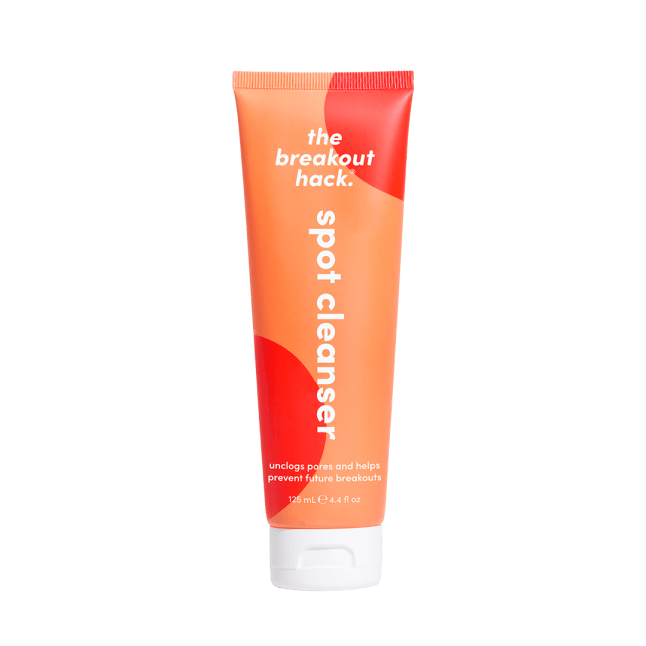
Spot Cleanser
This spot cleanser is a mild, moisture-boosting formula designed to manage and prevent breakouts without drying the skin. Powered by patented technology, it works to address blemishes while maintaining a clear, soothed, and balanced complexion. Free from benzoyl peroxide and salicylic acid, it’s an excellent choice for sensitive, acne-prone skin.
Their hero products, the Spot Cream and Spot Cleanser, use new-age patented technology to break down the skin’s protective “biofilm”, where treatments like salicylic acid and benzoyl peroxide struggle to penetrate, without causing any damage. The antibacterial technology effectively kills acne-causing bacteria and promotes a clearer complexion in as little as six weeks, with 84% of users seeing visibly clearer skin in just six weeks*.
Start with the Spot Cleanser, £12.99, which is a hydrating solution that removes dead skin cells, dissolves excess oil, and nourishes the skin to minimise the appearance of pores and blackheads. 89% of users said they noticed their skin felt less oily, whilst 93% found the cleanser was gentle on their skin*.

The Spot Cream
This spot cream delivers gentle but powerful breakout care, tackling blemishes without causing dryness or irritation. Using patented technology that focuses on the biofilm within the skin’s barrier, it helps reduce existing breakouts and stop new ones from developing. With no benzoyl peroxide or salicylic acid, it’s especially suited to sensitive, blemish-prone skin.
Then follow with The Spot Cream, priced at an affordable £15.99, a daily hydrating, non-drying cream that is to be applied after cleansing. Simply use the formula on the pimples and leave for 5 minutes to soak in before applying any serums or moisturisers. One user shared their joy at the results as they said: “This spot cream is a game changer for breakouts! It goes on light, doesn’t sting, and I noticed my spots looking calmer and less red by the next day.”
The brand also sells Multi-Size Pimple Patches, £12.99, which sells one every minute globally and has over 500 five-star reviews on boots.com. Like other patches on the high street, these are specially made to not only prevent pimple-picking and protect from external irritants, but also to prevent redness and pigmentation.
The story behind the brand is that it was founded for the customer, by the customer. Co-founder Rachael Wilde has experienced a 13-year-long battle with acne and recognised that the problem runs deeper than the skin’s surface. Rachael brought to the market a patented technology designed to prevent and control breakouts, alongside a fun brand:” Acne-prone customers deserve a brand they can relate to, have fun and trust.”
So, the next time you need a spot SOS system, look no further than The Breakout Hack, which not only minimises and treats the areas, but it will have your complexion glowing in no time.
*Claims based on a study of 127 Australian consumers testing The Breakout Hack’s Spot Cream, Spot Cleanser, and Patch It Up – Multi-Size Pimples Patches over a six-week period. 2024 survey conducted by Home Tester Club.
Follow Metro across our social channels, on Facebook, Twitter and Instagram
Share your views in the comments below
9 Dec, 2025 | Admin | No Comments
Princess Charlotte copies mum Princess Kate’s exact look – 7 months on

Princess Charlotte copied her mother, the Princess of Wales’ exact hair look from the VE Day concert in May 2025 as she joined her parents and brothers, Prince George and Prince Louis, at the ‘Together At Christmas’ carol service at Westminster Abbey.
9 Dec, 2025 | Admin | No Comments
Struggling on what to get your young boy this Christmas? We’ve got the perfect gift guide and it’s parent-approved


Metro journalists select and curate the products that feature on our site. If you make a purchase via links on this page we will earn commission – learn more
We don’t know about you, but finding the best Christmas gift for boys, of any age, can be difficult, especially if you want to opt for a gift that bucks the status quo of blue clothing, toy cars and footballs.
Whether you are buying a Christmas gift for a boy who is your own little one, a cherished nephew, godson, or another special family member, finding a present that truly sparks joy can feel like a tricky task.
Kids go through so many different phases, so the best gifts for boys are the ones that inspire curiosity and creativity. Whether he’s a budding baker, an aspiring scientist, a young adventurer, or a keen photographer, there is something for everyone.
Admittedly, buying a Christmas gift for a boy can vary depending on their age and interests; what may be the perfect Christmas gift for a boy aged six, will be different to an 11-year-old soon to be a teenager.
To make things easier, we’ve asked parents for their top Christmas present picks for boys, ranging from young children to pre-teens. This carefully curated guide is packed with ideas that are sure to bring big smiles on Christmas morning.
Just call us Santa, because when it comes to finding thoughtful, fun, and memorable gifts, we always deliver.
Shop The Best Christmas Gifts For Boys

Longline Padded Hooded Coat
The winter season means we are all desperately seeking winter warmers, and a cosy jacket is essential to keep the kids warm and dry too. We love this long-length parker, which is not only trendy, but practical and durable. Plus, it comes in a variety of sizes to fit boys aged 2-3 up to 7-8 years old.

Playmobil History Pharaoh's Pyramid
For ages six and above, this 98-piece playset invites kids to uncover five mysterious chambers filled with puzzles and traps designed to keep tomb raiders from stealing the treasure. It’s fantastic for developing motor skills, problem-solving, and imaginative play, and parents love that the ancient artifacts add a touch of historical learning too.

Marvel Avengers Flip FX Iron Man Mask
Got a Marvel fan in the family? This Avengers’ flip mask is the coolest piece of kit. With lights activating when it's flipped up, it lets little ones feel as though they're chatting with Jarvis. There's also an adjustable strap at the back to ensure a comfortable fit.

Science Experiment Kit Gross Experiments
If they love experiments and don’t mind a bit of gross-out fun, this science kit is a perfect pick. It's packed with delightfully disgusting activities, and turns learning about the human body into an engaging (albeit, slightly icky) adventure that’s as entertaining as it is educational. Special shout out to the vomit skull, which could definitely double as a Halloween decoration for next year.
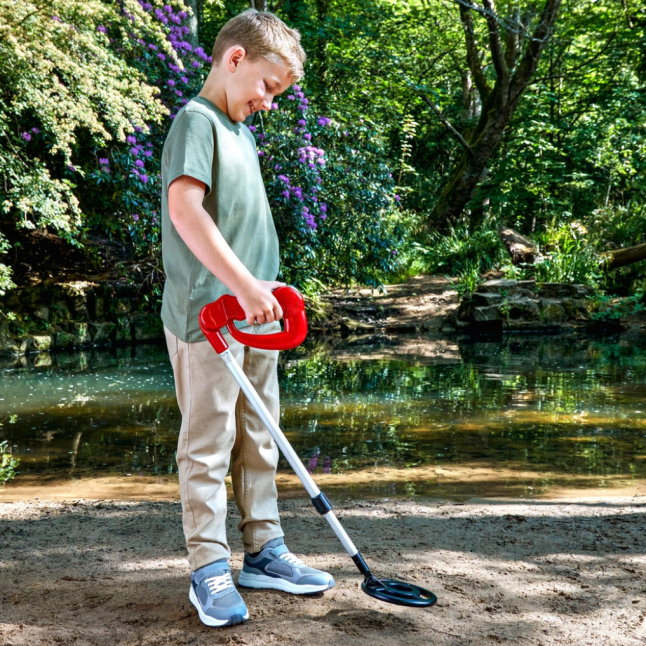
Fusion Science Metal Detector
Let your little explorer embark on their very own treasure hunts with this metal detector. It's designed to spark curiosity and adventure for future STEM minds, and features an LED light detection indicator as well as adjustable sensitivity settings, so they can fine tune their search for buried gems. The extendable handle grows right along with them, and parents say it’s perfect for hours of imaginative outdoor fun.

Fusion Science Refractor Toy Telescope
Got a starry-eyed little one? This Refractor Telescope is perfect for stargazing nights, featuring an interchangeable 18x to 90x power magnification, meaning they can zoom in on celestial wonders from 18 to 90 times closer than with the naked eye. Crafted with a high-quality optical glass lens, it delivers sharp and detailed images of the night sky, whether it's the moon, planets, or distant stars they want to get closer to.

Optimum Cartoon Rugby Balls
If you’ve got a young rugby star in the making, this Optimum rugby ball comes highly recommended by parents. It’s made with a premium Korean rubber outer and a durable dimpled finish, giving it excellent grip and tackiness in all weather conditions. Perfect for those classic wet British weekends. It's also Hand-stitched for that personal quality and comes in bright and bold colours for a little extra fun.

The Official Harry Potter Baking Book: 40 Recipes
Harry Potter fans might not be able to attend Hogwarts in real life, but this enchanting cookbook lets them bake their way through the school’s magical halls. It features 40 spellbinding recipes inspired by the beloved franchise, from Pumpkin Patch Pies to Owl Muffins, Luna’s Spectrespecs Cookies and Hogwarts Gingerbread. It also has colourful illustrations, as well as easy to read instructions. They'll soon be serving up a treat.

Dig Up Dinosaur Fossil Eggs
Mini paleontologists will love this dinosaur egg set. Inside, they’ll discover 12 dinosaurs encased in eggs, ready to be carefully excavated using the included chisel and brush tools. Just like a real paleontologist. Each set comes with fact cards for every dinosaur, so children can learn fascinating details after they free their prehistoric friends.

Kids Camera Instant Print
Let kids capture the world through their own eyes with this instant print camera. Designed for young photographers, it’s easy to use with simple buttons, making it perfect for ages 3 and up. Children can snap their favourite moments, explore fun filters, stickers, and simple editing tools, and even doodle on the black and white printouts to add a personal touch.

Fidget Spinners Toy
Fidget spinner toys are a great tool for help kids manage ADHD, stress, and anxiety. They offer a simple way to release nervous energy, and they can even improve focus and concentration. This set of three come in colourful designs, and are easy to fit in their pocket. Parents say they're invaluable for long trips or classroom learning.

Slimy Premium Super Value Pack
You might question the fascination kids have with slime but squeezing it between your hands is oddly relaxing. Plus, it can boost concentration, and encourage little ones to explore new textures. This set includes 52 colorful slimes, offering great value for money, and is safe for sensitive skin, so playtime is worry-free.

Personalised Wooden Spoon for Bakers
We think budding bakers will love this personalised wooden spoon. Add their name next to a sweet heart to give them their very own special kitchen tool, boosting their confidence with every bake. It’s also perfect for engaging little ones in cooking and baking, making every kitchen adventure a little more fun.
Follow Metro across our social channels, on Facebook, Twitter and Instagram
Share your views in the comments below
9 Dec, 2025 | Admin | No Comments
I spotted something on the baby monitor — then my daughter lost her eye
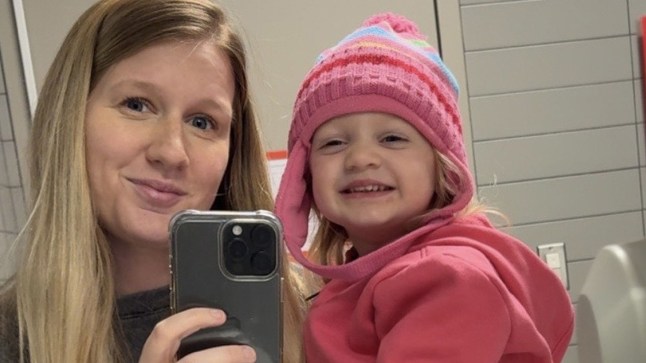

When Kristen Draime looked at her two-year-old’s baby monitor on November 8, her worst fear was confirmed – she knew her daughter had cancer.
The monitor had revealed a ‘glow’ in her daughter Miley’s eye, which turned out to be retinoblastoma.
‘I’d read an article about a mum who found a tumour in her daughter’s eye after she went to sleep on the baby monitor,’ Kristen, 28, recalls.
‘After we put her to sleep she was lying and had both her eyes open – it was so upsetting because I looked at the baby monitor and saw she also had a glow in her eye.’
But that wasn’t the first sign that something was wrong, it simply confirmed the mum’s suspicion Miley was very unwell.
‘A little bit after her second birthday in September we noticed her left eye was wandering,’ Kristen, from Cleveland, Ohio, says. ‘I pointed it out to my husband because I didn’t have a good feeling.
‘I had no reason to think of cancer, I didn’t know retinoblastoma existed.’
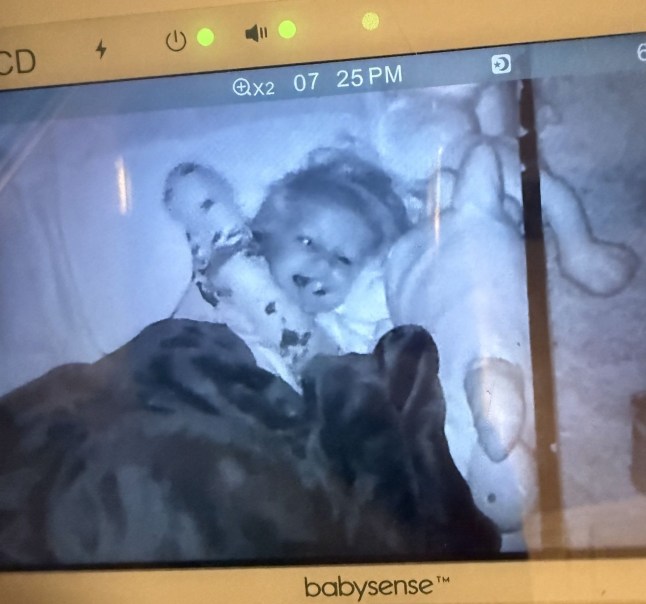
She sent a picture of Miley’s wandering eye to a paediatrician who referred her to an ophthalmologist, although they were going to have to wait until December to be seen.
‘They thought she needed glasses,’ Kristen adds. But before the young family could attend that appointment, things took a worrying turn in November when they were giving Miley a bath.
‘That night I saw her eye and thought “that’s not normal”,’ the mum explains. ‘We took a flash picture of her and saw the white in her pupil and I started freaking out.’
She began researching the worrying symptom online, with retinoblastoma -a rare cancer usually affecting children under the age of three – coming up as a possible cause.
It was that night she checked the baby monitor and saw the same white glow in Miley’s eye.
![PIC FROM Kennedy News and Media (PICTURED: [L TO R] ANDREW DRAIME, 37, LILLIAN DRAIME, 2 MONTHS, KRISTEN DRAIME, 28, MILEY DRAIME, 2) A mum claims a baby monitor saved her tot's life after it revealed a 'glow' in her pupil - that turned out to be cancer. Kristen Draime was concerned about her daughter Miley Draime when she noticed her left eye 'wandering' in September 2025 and booked an appointment with a doctor. Initially reassured it wasn't anything to worry about, the paediatrician referred Miley for a December appointment with an ophthalmologist to rule out anything more serious. DISCLAIMER: While Kennedy News and Media uses its best endeavours to establish the copyright and authenticity of all pictures supplied, it accepts no liability for any damage, loss or legal action caused by the use of images supplied and the publication of images is solely at your discretion. SEE KENNEDY NEWS COPY - 0161 697 4266](http://curiousdrive.com/wp-content/uploads/2025/12/SEI_276605645-a9f4.jpg)
‘The next morning I covered her good eye with my hand and her other eye just went completely left, there was no vision in it,’ Kristen recalls. ‘We immediately went to the ER and I could tell they were concerned.’
An oncologist soon arrived and told the parents it was retinoblastoma, confirming Miley had no vision in one eye.
‘Even though I knew, to hear it was terrible,’ she adds.
An ultrasound and MRI revealed the tumour behind the eye which covered her Miley’s entire eyeball, and doctors told the parents it was ‘blastoma stage E, which is the worst’.
The two-year-old had her left eye removed on November 22, and is now waiting for a biopsy to determine whether she will need chemotherapy. Miley may also be getting a prosthetic eye.
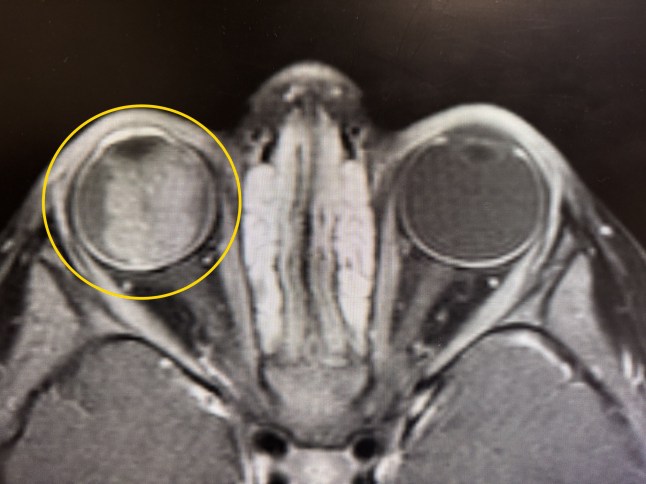
She and her husband Andrew, 33, have been navigating this all while caring for their eight-week-old newborn Lilly and 13-year-old daughter Aniston, and have set up a Go Fund Me because they are unable to work while Miley undergoes treatment.
Now, Kristen is sharing her story with others in hopes other parents will know the signs to look out for.
Retinoblastoma
Retinoblastoma can appear in one or both eyes, and affects the back of the eye (known as the retina) which sends signals to the brain to help you see.
Around 44 children are diagnosed with this cancer each year in the UK.
The main symptom is a white glow or reflection in the pupil, which you may be able to spot just from looking at the eye, or in photos where flash has been used.
Other symptoms include:
- the eyes pointing in a different direction (squint)
- the coloured part of the eye (iris) changing colour
- swelling around the eye
- uncontrolled eye movements
- vision problems
- pain in 1 or both eyes
It can usually be successfully treated if found early, although there is a high chance your child will lose some or all of their vision in the affected eye.
Treatment depends on the size of the tumour, where it is, if it’s spread and your child’s age and health. It’s possible you’ll be offered chemotherapy, laser treatment, cryotherapy, radiotherapy and/or surgery.
Source: NHS
‘I would say the flash on my camera and the baby monitor saved her life,’ she says. ‘She had no vision for a month and we didn’t even notice. Having her eye removed has been hard to process, I’ll never see her two eyes again together.
‘I was hard on myself but I learned there wasn’t anything more we could have done, by the time we noticed the symptoms it was too late and we have no family history of this.
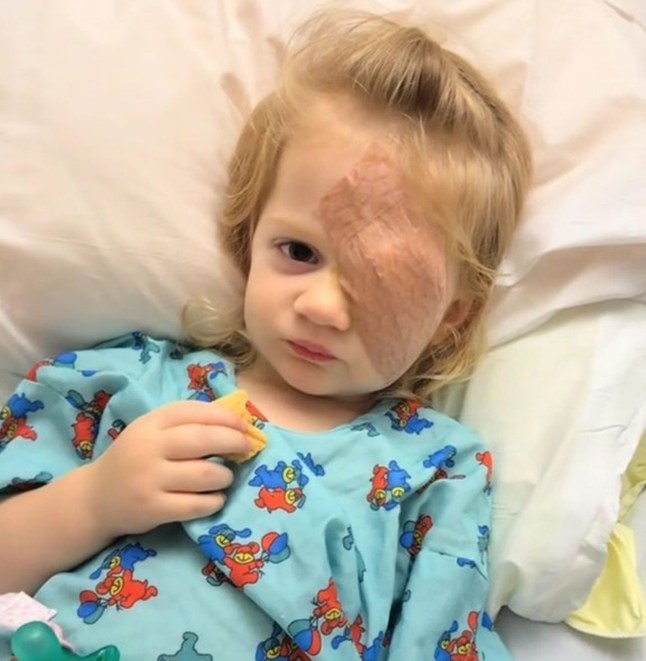
‘If anyone sees a light in their kid’s eye and sees white instead of red there could be a tumour behind the pupil.’
Doctors assured Kristen there aren’t many other symptoms, so it’s hard to spot.
‘Miley was completely normal, maybe a little clumsy, from losing her vision but I thought that was just toddler stuff,’ she adds. ‘Any kind of eye wandering, people should go to an oncologist.
‘Now I know baby monitors can help diagnose it, it’s wild, I had never heard of it.’
Do you have a story to share?
Get in touch by emailing MetroLifestyleTeam@Metro.co.uk.

